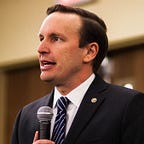Counseling Not Criminalization in Schools
So I’ve heard this week from people in Connecticut with questions about my proposal to limit federal funding for police in schools, and I want to take a minute to walk you through why I think this bill is important, but also to clear up some misconceptions about what it does and doesn’t do. I hope you’ll take a second to read this.
I get that this is an emotional issue. As a parent of two school-age kids, nothing matters more to me than my children’s safety. And I also know that there are a ton of professional, kind-hearted police officers in Connecticut who serve in our schools. Lots of parents and kids trust them, for good reason.
The problem is that the experience that students have with police in schools is often very different for Black and Latino students. Often, in these schools, officers end up arresting kids for common hallway misbehaviors. For instance, in our state, Latino students who go to a school with a police officer present are six times (six times!) more likely to get arrested than if they go to a school without a police officer. The same study found that Black students are twice as likely to get arrested in our state when a police officer is present. We just can’t ignore this reality. Part of the reason why people of color represent 32% of the population but 56% of the nation’s prison population is that there exists a “school to prison pipeline” for Black and Latino young people, where ordinary misbehavior in school too often leads to a life of incarceration.
This is one of those issues where white families and Black families often sound like they are living in different universes. And in many ways, they are. In suburban schools, police officers almost never arrest students. Students feel genuinely protected by these officers. But too often, in some city schools, students feel like the police aren’t there to protect them at all, and they wonder why their school can afford a police officer but not a single guidance counselor or social worker.
This, of course, makes the conversation about what to do about police in schools hard, because we don’t share common experiences. But at this moment, when we have all pledged to take more seriously the injustices being perpetuated against people of color, we have to understand that sometimes policies that appear race-neutral — like putting police officers in schools — end up having a disparate impact on people of color.
So here’s what I’ve proposed — I think it’s important to know what my bill does and what it doesn’t do.
The bill I introduced this week doesn’t ban police in schools. I may not want police officers in my kids’ school, but I agree that this decision should be up to parents and teachers, not the federal government. All my bill says is that federal funds that go to schools (and most federal funds go to low-income schools) should be used to hire social workers and counselors instead of police officers.
My bill doesn’t penalize schools for hiring police officers; it just says that federal education funding should be used for other purposes. And importantly, it sets up a new source of funding for schools that want to build security and safety with counselors and other health professionals instead of police.
Also, my bill doesn’t stop federal funding from being used to hire non-police security personnel. I agree that many schools need security officers. I just think that these officers shouldn’t also have the power of arrest. That power, inside the schools, too often criminalizes children of color in a way that makes us all morally poorer.
Listen, nothing is more important to us than our kids’ safety. But at this moment of reckoning, when we have all pledged to better understand the experiences of people of color, we need to be more careful about how we build safe schools.
My bill doesn’t get rid of police in our schools, but I hope it does prompt a discussion about building school safety policies that apply equally to all schools and all students.
